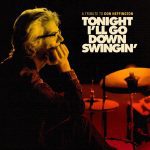FOUNDERS’ KEEPERS: The Missing Years

Photo by Peter Howell / Getty Images Signature
These days, alas, there is no danger of wobbling late Friday night 10 blocks over to Peaches Records and looking for love in the cut-out bins. (Oh, but that Legendary Christine Perfect album.) The habit never entirely leaves, even as it becomes more difficult to justify what sneaks through the front door and onto a shelf next to all the other music one hasn’t yet absorbed. Crate diving, even in all its modern incarnations, is about finding things left behind, undervalued, undiscovered. Unearthing magic.
A balancing act, and weren’t they a fine band?
(Oh, wait. It was The Bears who wrote “Grandma’s Pearls.” They’re in the far corner in the back of the room, together on the same shelf. I’m sure The Balancing Act were a fine band but I can’t remember anything beyond their name. But I kept the LP. That’s something, right?)
Well. I quit all of that, a long time ago.
Almost.
Consider this a Christmas present. What I found out in the wilderness when I wasn’t really looking anymore.
1. The right song will take the whole day with it.
Change your life, yes.
(So, too, will the wrong song.)
The right song — take, for example, Bobby “Blue” Bland’s “Back in the Same Old Bag” — can also … oh, hell. I thought he was a second-tier hack, and maybe by the time he was making records I got sent for free that’s what he was. Certainly artists of his generation were not offered the kind of late-career love given to Johnny Cash, say.
No excuse.
“Back in the Same Old Bag,” the version I’m listening to, anyway, was recorded for the Duke label and first released in 1966. It is not a song for children. Nor is it an ode to teen attraction. No, this is about running into the toxic partner you dumped but still love. Still need. A guitar opens, quickly joined by a glorious horn phrase that swells into Bland’s singular voice, honey and barb both flexing within the same line, and nothing but the complexity of hurt and need running through it. Plus it’s a bop. Two and a half minutes.
Two more tracks from that era are worth attending to, by way of introduction. “Rockin’ in the Same Old Boat” is the saddest pick-up song ever: We’ve both been dumped, let’s get together, tonight, but I’m going to be thinking about her. Slow, brooding interplay between guitar, bass, and those wicked, joyous horns. Tense and release, with a short story in the bargain. Finish with “Sweet Lips of Joy,” which opens “I was born / the day you kissed me,” and caresses every line after with tenderness. Except, of course, he did her wrong. “How can you take an eye for an eye / Baby, when you know I’m blind?”
2. I do not often take my black dog out for a walk now, much less remove his leash so that he can roll freely in the excrement of the day. Still, we are old friends. (This is true both ways. I share a reading chair with an old furry friend who does not answer to Special Agent Dale Cooper, nor to anything else. He is black, though we both tend to gray.)
It seems unwise, then, to try too diligently to reckon with my undiminished appetite for slow, sad songs, to navigate around the lure of certain kinds of broken-hearted voices to which I recklessly return. Oh, but there’s kinship to be had borrowing the emotions of strangers like, say, Hank Williams, or Ted Hawkins, or listening to Ray Price sing “Night Life.” We are not kin and they’re all dead. One writes from comfort and privilege, just the act of writing signifies that, especially these days. Still, there is enduring magic — yes, I will insist, magic — in what a voice can do, where sound can take you, how it can break through walls of profound solitude and discontent. Even as one knows the experience was crafted in a studio, to be repeated on countless stages.
In defense of my weakness, please consider three examples.
Start with a relatively minor 1963 release from the immortal Howlin’ Wolf titled “300 Pounds of Joy.” Two horns, Hubert Sumlin’s impeccable guitar, light drums down the hall, Willie Dixon presumably on bass since he wrote the thing. It swings. I can’t make understood to young people what that means, swinging, and lack the education to explain it properly. Something to do with feel and the beat, and I’m convinced the conservatories beat it out of students and ProTools erases it as imperfection. But listen, please, to the melody change hands between those instruments, to the boastful ebullience of Mr. Wolf, to the simplicity of every single piece of the song and the complexity with which those pieces swing together.
Then follow George Champion’s guitar lines as they lead and follow Peck Touchton’s dry, drawn-out vocals through “My Baby’s Not Around,” a painfully obscure 1956 single from the Sarg label of South Texas. Guitar and voice twine like briar and rose, if the briar were a tumbleweed and the rose was a sunset. Nothing else Mr. Touchton and the Sunset Wranglers recorded comes close to capturing this majesty, but there are only a handful of better songs from the honky-tonk era.
Guitarist Lonnie Smith’s quiet chord opens The Harmonizing Four’s 1955 “Come Over Here,” then trails effortlessly behind bass singer Jimmy Johnson’s profoundly flexible, delightfully rich, impossibly deep lead. Yes, it’s a sad, loping song about the sweet hereafter, but the quartet conveys an abiding peace throughout. And that voice, those voices, together. The Harmonizing Four were sufficiently well-known to have sung at President Roosevelt’s funeral and Sister Rosetta Tharpe’s wedding. Perhaps they recorded for the wrong labels.
Those three songs, they all do the same thing, resonate in the same way.
3. Ah, but one can’t brood the whole night away. Nat Stuckey’s resume includes writing Jim Ed Brown’s “Pop a Top” and co-writing Randy Travis’ “Diggin’ Up Bones.” “Plastic Saddle” was one of his few charting hits as a singer, No. 9 in 1968. It’s a glib, glorious boasting confection, written by Vic McAlpin, the species of song that became hits for Jerry Reed. From this distance it’s not clear what, exactly, if anything “Plastic Saddle” was meant to be about: artifice and the arts of love, sure, and possibly unprotected sex. Certainly, at its root, it’s about the objectification of women.
What, then, to make of June Stearns’ wry and sassy version from her 1969 album River of Regret? Take it for an excuse to climb down the rabbit hole of her career, to discover the work of a singer voted “Third Most Promising Artist” by Cash Box in 1968 who cut her last country session in 1972. Stearns played in Roy Acuff’s band, left the road when a car wreck broke her ankle, and had some mid-chart success. Dive in. “Let me feel that leather when I ride.”
Also, for some reason, Danny O’Keefe covered “Plastic Saddle” in 1977 and it sounds like Marc Bolan on guitar. (You’re welcome.)
4. Almost every morning I get up early and write for an hour. Or try to. And then go to work. Mostly I don’t listen to anything, except during certain phases of rewriting, when I need the distraction and a little help from somebody else’s melody. Other people’s words get in the way.
For decades I have been devoted to the Violin Sonatas and Partitas of J.S. Bach, each the length of a 1970s pop song, just the purity of melody and violin. Three versions live on my hard drive, beginning with Nathan Milstein’s 1973 recording and ending with Chris Thile’s brave and glorious 2013 mandolin transcriptions. Or, for the day’s other mood, try The Complete Jack Johnson Sessions from Miles Davis. Especially the tracks with Mahavishnu John McLaughlin going full force, the bass loping in place, waiting for the mood to strike Miles. It’s a spiky, joyous thing, just raw sessions that are only available because, well, Miles Davis. And that’s enough.




